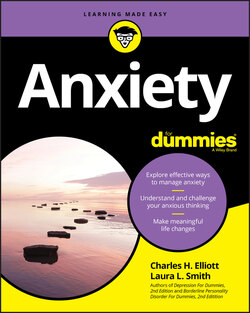Читать книгу Anxiety For Dummies - W. Doyle Gentry, Laura L. Smith - Страница 42
How Anxiety Differs from Other Emotional Disorders
ОглавлениеAnxious symptoms sometimes travel with other company. Thus, you may have anxiety along with other emotional disorders. In fact, about half of those with anxiety disorders develop depression, especially if their anxiety goes untreated. Recognizing the difference between anxiety and other emotional problems is important because the treatments differ somewhat.
Obsessive compulsive disorder: A person with OCD may exhibit behaviors that include an obsession, a compulsion, or both. Obsessions are unwelcome, disturbing, and repetitive images, impulses, or thoughts that jump into the mind. Most people who have OCD know that their obsessions are not entirely realistic but can’t seem to stop believing them. Compulsions are repetitive actions or mental strategies carried out to temporarily reduce anxiety or distress. Sometimes, an obsessive thought causes the anxiety; at other times, the anxiety relates to some feared event or situation that triggers the compulsion.OCD used to be considered an anxiety disorder. Although OCD certainly involves some anxiety, recent research indicates that it affects different parts of the brain than anxiety. OCD also entails problems with impulsivity that are less common in anxiety.
Post-traumatic stress disorder (PTSD): You may have PTSD if you experience or witness an event that you perceive as life-threatening, causing serious injury, or sexual violence, and you feel terror, horror, or helplessness. You may also get PTSD from being a first responder witnessing trauma or by being close to someone who has been traumatized. You relive the event through flashbacks or memories. You try to avoid reminders of the event. Your thoughts and moods may be bleak, irritable, and easily triggered.PTSD used to be considered an anxiety disorder. It was moved into a category of trauma disorders. Although PTSD does usually include anxiety symptoms, it also frequently is accompanied by anger, self-destructive behavior, and feelings of unreality.
Depression: Depression can feel like life in slow motion. You lose interest in activities that used to bring you pleasure. You feel sad. Most likely, you feel tired, and you sleep fitfully. Your appetite may wane, and your sex drive may droop. Similar to anxiety, you may find it difficult to concentrate or plan ahead. But unlike anxiety, depression saps your drive and motivation. For more information, see our book Depression For Dummies (Wiley).
Bipolar disorder: If you have bipolar disorder, you seesaw between ups and downs. At times, you feel that you’re on top of the world. You believe your ideas are unusually important and need little sleep for days at a time. You may feel more special than other people. You may invest in risky schemes, shop recklessly, engage in sexual escapades, or lose your good judgment in other ways. You may start working frantically on important projects or find ideas streaming through your mind. Then suddenly you crash and burn. Your mood turns sour and depression sets in. (Check out Bipolar Disorder For Dummies by Candida Fink, MD, and Joe Kraynak [Wiley] for more about this disorder.)
Psychosis: Not only may psychosis make you feel anxious, but the symptoms also profoundly disrupt your life. Psychosis weaves hallucinations into everyday life. For example, some people hear voices talking to them or see shadowy figures when no one is around. Delusions, another feature of psychosis, also distort reality. Common psychotic delusions include believing that the CIA or aliens are tracking your whereabouts. Other delusions involve grandiose, exaggerated beliefs, such as thinking you’re Jesus Christ or that you have a special mission to save the world. If you think you hear the phone ringing when you’re drying your hair or in the shower, only to discover that it wasn’t, you’re not psychotic. Most people occasionally hear or see trivial things that aren’t there. Psychosis becomes a concern only when these perceptions seriously depart from reality. Fortunately, anxiety disorders don’t lead to psychosis.
Substance abuse: When people develop a dependency on drugs or alcohol, withdrawal may create serious anxiety. The symptoms of drug or alcohol withdrawal include tremors, disrupted sleep, sweating, increased heartbeat, agitation, and tension. However, if these symptoms only come on in response to a recent cessation of substance use, they don’t constitute an anxiety disorder.
Those with anxiety disorders sometimes abuse substances in a misguided attempt to control their anxiety. If you think you have an anxiety disorder, be very careful about your use of drugs or alcohol. Talk to your doctor if you have concerns.
